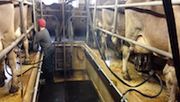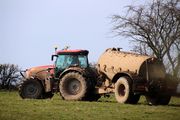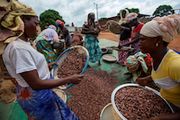EMB Newsletter April 2020
Newsletter as PDF
Contact
EMB - European Milk Board asbl
Rue de la Loi 155
B-1040 Bruxelles
Phone: +32 - 2808 - 1935
Fax: +32 - 2808 - 8265
Dear dairy farmers, dear fellow campaigners,

The year 2020 got off to a bad start: numerous storms in Europe, analysts predicting a stock market crash in the course of the year and, finally, this virus from far away that has spread all over the world.
I must, however, admit that there has been a glimmer of hope and optimism for our profession as dairy farmers since January. The EMB had two meetings with the new European Commissioner for Agriculture, who seems to take a much less liberal approach than his predecessor Mr. Hogan. He seems conscious of the future challenges facing both farming and farmers, the environment, as well as the planet and its inhabitants. Our production needs to be healthier, cleaner and closer to consumers. But we also have to make the case for decent and cost-covering prices that would allow this production to be sustainable and, above all, viable. For the well-being of us all, for existing and new farms and related activities in all our regions. It seems as if our fight against the market economy is finally bearing fruit!
This infamous virus has led many citizens to step back and reflect on issues that we at the EMB have been raising for years. Issues that are at the heart of good common sense. As I write this editorial, we are already facing a cruel shortage of medication and medical devices in Europe! To be expected, with most of the production concentrated in Asia. Our medical independence is in danger! It is a bitter pill to swallow when a shortage implies tough choices: who will we be able to treat and save?
We are in this situation because the market economy has reigned supreme for years! Protection and support for our laboratories, our researchers, our healthcare and thus our medical sector have been completely ignored. This is unacceptable, albeit numerous organisations have been working to resist this system for many years. And we are heading down precisely the same path with respect to agriculture, the sector that feeds us!
I only dare hope that following this tragic period, our policy-makers will adopt the right solutions, using good common sense, as farmers would do. We are calling upon member states to activate our Market Responsibility Programme now!
Adapting production to real market demand and pooling farmers in producer organisations to strengthen their position have been the EMB's flagship demands. The objective is to achieve good prices and a decent income that would keep people working the land and even add to their numbers. Food self-sufficiency in Europe – that is the need of the day! I can, however, sadly attest that this is no longer the case and has not been for many years. We need to change the system because after medicines, we are going to start running out of basic foodstuffs.
Take care of yourself and your family, and assume your responsibility as a citizen. It is the time for collective resistance!
Boris Gondouin, EMB Executive Committee member
Corona crisis: The milk market is under increasing pressure
Coronavirus: dairies and their associations must take action
Historically low production volumes, but a milk price that does not go up: a critical evaluation of the "green carpet"!
Nitrates Directive: situation in France and Ireland
Fairebel chocolate milk – a product that supports women cocoa producers
Impressum
European Milk Board asbl
Rue de la Loi 155
B-1040 Bruxelles
Phone: +32 2808 1935
Fax: +32 2808 8265
E-Mail: office@europeanmilkboard.org
Website: http://www.europeanmilkboard.org





